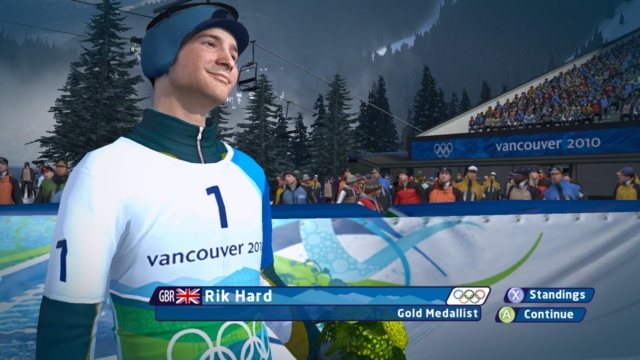
Vancouver 2010
Written by: Rik
Date posted: February 7, 2022
- Genre: Sport
- Developed by: Eurocom
- Published by: Sega
- Year released: 2010
- Our score: 5
The thought recently occurred to me that my first experiences of Olympic events were through gaming rather than on television. When I think of Daley Thompson, I’m sorry to say that the first image that comes to mind is of a little sprite athlete scratching his head having failed to successfully put a shot rather than TV celebrations of real-life Olympic gold. Did games based on athletic events continue to exist because of interest in those real-life events? Or was it the residual fondness for those early 80s tie-ins which actually sustained the genre?
I say this because, despite never having actually been one of those people who rushes out and buys an ‘event’ sporting tie-in upon release, I nevertheless expect that they will, and should, exist in perpetuity, as part of the grand gaming tradition of licensed titles for which a market will always be reliable and constant.
Which, as it turns out, is not the case: the game in question here, despite being 12 years old, is the last official stand-alone game based on a real-life Winter Olympiad. There’s nothing for the 2022 event currently taking place, there was nothing for the previous two winter events (unless you count some Olympic-themed DLC for Steep, an existing winter sports game) and nothing for the 2016 Summer Olympics either. Hell, they don’t even make football World Cup games any more.If such things are now consigned to the past, there are at least a few older efforts to have a look back at, with a full complement of releases in the 00s. This one made it through the rigorous FFG selection process first on account of it being developed by the same people responsible for Beijing 2008, with which I had a fairly good time, despite a few oddities and eccentricities.
While Beijing 2008 was possibly over-stuffed with events, the 38 previously on offer has been slimmed down to 14 for this winter equivalent, which seems a little bit on the stingy side, even if necessitated by similar disparities in real life. And lots of the events are fairly similar: skiing and snowboarding dominate, supplemented by three categories of ice sleigh, and speed-skating over two distances. There’s little on the slower-paced and more technical side – no curling or figure skating – and we’re also spared any cross-country skiing events or the dreaded biathlon of 90s Winter Challenge fame.
Indeed, there’s a definite feeling of trying to keep things breezy and upbeat, and possibly even tap into a more high-octane extreme sports vibe. No single event lasts very long, with a full Olympics detaining you for less than an hour, as you whip through a succession of brief but intermittently exciting mini-games accompanied by some pop-punky type music that mostly sounds like Canadian rockers Sum 41 (even if only one of the featured songs is actually theirs).
Meanwhile, the entire career structure that underpinned Beijing 2008 has been completely dismantled, so there’s no requirement to do well on a particular event to progress, no energy levels to manage or stats points to allocate. While I’m not particularly bothered about the last two, which never made much sense in the first place, I thought the general idea of making you hit certain targets on each day was quite a good one, and it was done in such a way as to encourage practice while allowing enough leeway for you to completely tank some events without penalty.
Here, you can be as crap as you like, which I guess might be more appealing to some, although it has the effect of making Vancouver 2010 seem rather insubstantial. And no event ever seems to have more than four nations competing in it, meaning the worst you can ever do is fourth, and even being fairly crap will get you a bronze. As with Beijing 2008, the medals themselves are conspicuous by their absence during the presentation ceremonies, while the sparse opening and closing sequences of the previous game have been excised completely here.
Which leaves the events themselves, all of which are pretty accessible, with none falling into the category of unfathomable. The alpine skiing events all use the same control scheme, based on tapping a button to start, hammering it to build up power, then using a combination of trigger buttons to control speed while steering through the course. The featured men’s events – downhill and super-G – are all about speed and plotting the quickest line through the course on a single run, while the ladies’ slalom and giant slalom are more about control. Missing gates in any of the events will cause your athlete to slow down and lose time on the course rather than having penalties applied later, which seems a little unrealistic, but actually allows you to keep better track of how you’re actually doing.
These events benefit, both visually and practically, from use of the first-person view, which conveys an unsettling sense of precariousness and speed while also allowing you to more easily focus on the route through upcoming gates. Even though your chances of wiping out are minimal, it still feels dangerous, and so you’re placed in that sweet spot of exhilaration that comes from feeling in expert control of something potentially catastrophic.
Ladies’ ski cross and men’s snowboard cross are broadly the same event and take place on the same course, with the same basic control setup as in alpine skiing. Other than navigating the various turns, you have to tap a button to jump at a handful of points, successful execution of which will give you a speed boost. It’s hardly high-octane stuff, but both are inoffensive enough, although I found the slight difference in difficulty between the two slightly baffling: I could usually win the snowboarding but tended to come second in ski cross. The other snowboard event is giant slalom, a head-to-head affair against a single other competitor, with the same principles and controls as its alpine skiing counterparts.
The two concessions to technique are the ski jump and aerial freestyle skiing. The former combines a mildly terrifying first-person view with a series of timed button presses to launch and land, while the two trigger buttons on the pad are used to maintain balance while airborne. At the end, scores for distance, style and landing are totted up to give you a total. Aerial freestyle is fairly similar, except while in the air you need to use the left and right sticks on the pad to match the rotation patterns of your chosen jump, in a manner similar to the diving events in Beijing 2008.
Onto the ice, and the bobsleigh, luge and skeleton, all of which are extremely similar, to the extent that only a need to check the slightly different controls (one stick to steer the skeleton, two sticks for bob, and triggers for luge) offers any real distinction. (Fortunately, the in-game tutorials can be called up prior to each event, if you don’t have the manual handy). Bobsleigh is arguably the hardest, being heavier and less manoeuvrable and more inclined to hit the sides or tip over. The higher up the sides you go, the more speed you can build up, but the more likely you are to roll and crash out. All offer moderate excitement, with an occasional sense that you’re not actually doing very much quickly being punctured by a foul-up brought about by a loss of concentration.
Which leaves us with speed skating, a button-basher across 500 metres and a combination basher/rhythm effort across 1500. Again, these are best experienced in first-person, particularly the latter, which otherwise requires you to make a guess as to when your skater’s blades are hitting the ice to maintain speed rather than simply hitting a button in time with an on-screen prompt. Once you get a hang of these events, they both seem deceptively easy, but a march to victory can easily be derailed by a late misjudgement on a corner, causing you to lose speed.
And that’s it. While your overall progress in terms of medals (and points) is monitored and displayed at the end of each event, there’s no reward for finishing top of the table, and indeed no acknowledgement that your Olympics is even over, other than a return to the menu. And if you don’t happen to remember or take note of what your last event is (you’re free to play through them in any order you like, or get the computer to randomise) then your performance will be lost forever as, like Beijing 2008, Vancouver 2010 is tied to a now-defunct online service (in this case, Games for Windows Live) which somehow means that retention and display of all of your local, single-player performances is somehow impossible. You do get notice when you beat a personal best in a particular event, but you can’t view these anywhere.
I realise that the interests of future people belatedly checking out second-hand games aren’t at the forefront of any developer’s mind, but it does seem remarkably short-sighted to not have something as basic as a high-score table available. I ended up having to write down what the last event was and making sure to take a screenshot to record my performance, also writing that down, if it was particularly good (7 golds, 4 silvers, 2 bronze was my best, without restarting an event after mucking up, which is permissible here) in case I’d forgotten to have Fraps running in the background.
Overall, I think a sense of disappointment permeated my experience – from the realisation that these kinds of games aren’t a big deal anymore, to the event list that feels a little slight and the complete lack of accompanying ‘big event’ presentation, as well as the feeling that the consequences of more modern games being ‘abandoned’ are more grave than simply not being available for purchase any more. But Vancouver 2010 still sort of does its job in terms of providing a lightweight recreation of a selection of winter sports events for the casual enthusiast.
It certainly doesn’t take long to get the hang of most events, turning the main challenge into stringing consistent performances together across all 14 to get as many golds as possible (I think I got gold in most individual events at some point or other). I suppose my historic memories and expectations (going back to the likes of Winter Challenge, but including even Beijing 2008) are that there should be some events that are completely rock hard and virtually impossible, but in a way it was quite nice to be pushing for success in each and every one for a change.
What that does mean, though, is that Vancouver 2010 doesn’t last very long at all. With the career mode stripped away, the only other concession to bulking things out is a series of further standalone challenges. It’s fairly thin gruel, though, with things like reversed controls (‘Be good at snowboarding… in OPPOSITE LAND!’) and the chance to beat one of the developer’s race times doing little to muster further enthusiasm. Across the first few hours at least, though, there are some moments of excitement and fun to be had.

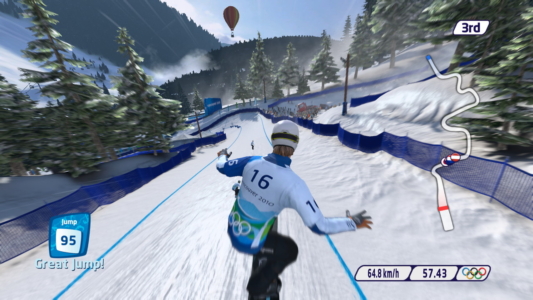
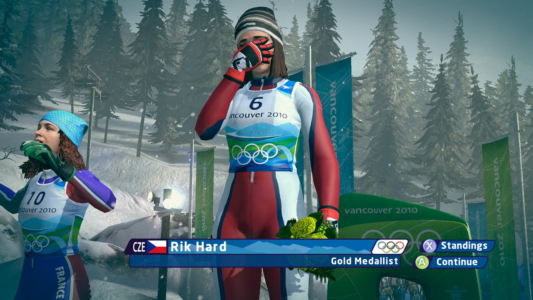
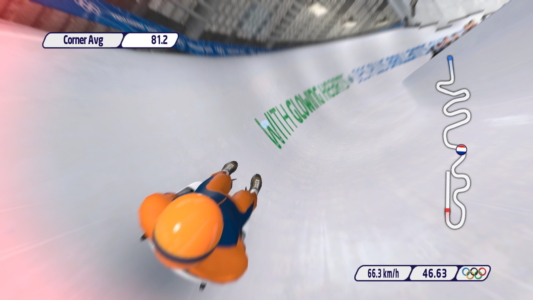
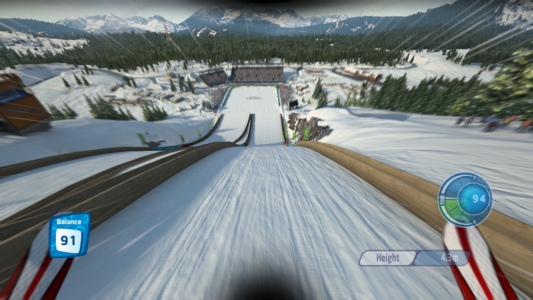
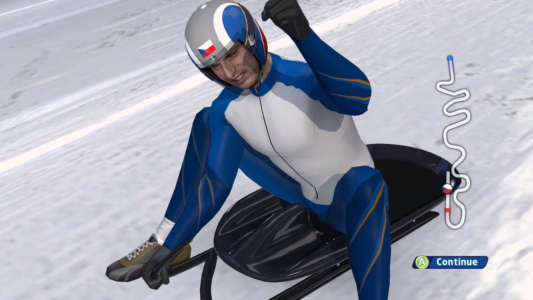

 Posts
Posts